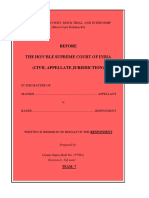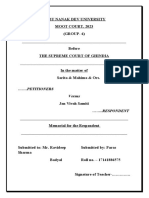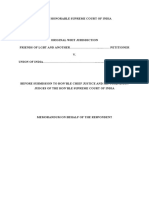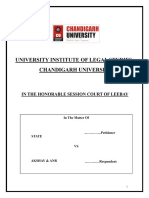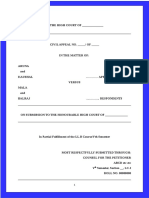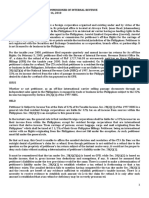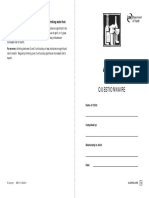LT-13 Respondent
LT-13 Respondent
Uploaded by
jashCopyright:
Available Formats
LT-13 Respondent
LT-13 Respondent
Uploaded by
jashOriginal Description:
Original Title
Copyright
Available Formats
Share this document
Did you find this document useful?
Is this content inappropriate?
Copyright:
Available Formats
LT-13 Respondent
LT-13 Respondent
Uploaded by
jashCopyright:
Available Formats
Team Code: LT-13
NATIONAL MOOT COURT COMPETITION 2023
JITENDRA CHAUHAN COLLEGE OF LAW
________________________________________________________
BEFORE THE HON’BLE SUPREME COURT OF INDIANA
________________________________________________________
IN THE MATTER BETWEEN:
AMRITA KUMAR & ANR …PETITIONER
Versus
UNION OF INDIANA …RESPONDENT
______________________________________________________
MEMORIAL FOR RESPONDENT
________________________________________________________
2
LIST OF CONTENTS
List of abbreviation ………………………………………………………………… 3
Index of authorities ………………………………………………………………… 4-6
Statutes………………………………………………………………… 4
Books………………………………………………………………….. 4
Articles………………………………………………………………… 4
Dynamic Links ………………………………………………………... 4
Table of Cases…………………………………………………………. 5
Statement of Jurisdiction …………………………………………………………… 7
Statement of facts …………………………………………………………………… 8-9
Issues raised …………………………………………………………………………. 10
Summary of arguments ……………………………………………………………… 11-17
Arguments advanced ………………………………………………………………… 18-24
Prayer ………………………………………………………………………………… 25
MEMORIAL ON BEHALF OF THE RESPONDENT
3
LIST OF ABBREVIATIONS
1. LLB- Legum Baccalaureus
2. LGBTQ+- Lesbian Gay Bisexual Transgender Queer
3. v.- Versus
4. HC- High Court
5. SC- Supreme Court
6. &- And
7. HMA- Hindu Marriage Act, 1955
8. SCC- Supreme Court Cases
9. UOI- Union of India
10. TG- Transgender
11. HR- Human Rights
12. HAMA- Hindu Adoption and Maintenance Act, 1956
13. CrPC- The Code of Criminal Procedure, 1973
14. SRS- Sex Reassignment Surgery
15. Trans Act- The Transgender Persons (Protection of Rights) Act, 2019
16. Ors- Others
17. Anr.- Another
18. SMILE- Support for Marginalised Individuals for Livelihood and Enterprise
MEMORIAL ON BEHALF OF THE RESPONDENT
4
INDEX OF AUTHORITIES
STATUTES
1. Code of Criminal Procedure, 1973
2. Constitution of India, 1950
3. The Transgender Persons (Protection of Rights) Act, 2019
4. Hindu Adoption and Maintenance Act, 1956
5. Hindu Marriage Act, 1955
6. The Surrogacy (Regulation) Act, 2021
7. The Transgender Persons (Protection of Rights) Rules, 2020
BOOKS
1. H.M SEERVAI, The Regulations for Surrogacy: A critical commentary [Delhi Universal
Law Publishing Co. Ltd]
2. KELKAR R. V., Protection of Transgenders Rights, Pillai Eastern Book Company, 4th Ed.
2007 (Revised by Dr. K. N Chandrashekharan)
3. D. D. BASU, Adoption and Maintenance Regulations for Hindus, Lexis Nexis
Butterworths, Wadhwa, Nagpur
ARTICLES
1. RAMANAND GARGE, Protection of Transgender people’s rights: An Indian
Introspection, Vivekananda International Foundation.
2. FATF (2015), The Indian constitution, FATF, Paris
www.fatf-gafi.org/publications/methodandtrends/documents/emerging-constitution.html
3. ANIL KALHAN, GERALD P. CONROY, MAMTA KAUSHAL, SAM SCOTT
MILLER, JED S. RAKOFF “Code of Criminal Procedure and Human Rights” Colum. J.
Asian L. 93 2006-2007
MEMORIAL ON BEHALF OF THE RESPONDENT
5
DYNAMIC LINKS
1. www.manupatra.com
2. www.scconline.com
3. www.westlawindia.com
4. www.lexisnexis.com
MEMORIAL ON BEHALF OF THE RESPONDENT
6
TABLE OF CASES
Sr. No Case Laws Citation
1. Rina Kinnar v/s State of UP WRIT - C No. - 23663 of 2019
2. Kabeer C v. State of Kerala (2021) WP(C) NO. 29247 OF 2019(S)
MEMORIAL ON BEHALF OF THE RESPONDENT
7
STATEMENT OF JURISDICTION
The Hon’ble Supreme Court of Indiana has the inherent jurisdiction to try, entertain and dispose
of the present case by the virtue of Article 136 of the Constitution of Indiana.
“Article 136. Special leave to appeal by the Supreme Court
(1) Notwithstanding anything in this Chapter, the Supreme Court may, in its discretion, grant
special leave to appeal from any judgment, decree, determination, sentence or order in any cause
or matter passed or made by any court or tribunal in the territory of India
(2) Nothing in clause (1) shall apply to any judgment, determination, sentence or order passed or
made by any court or tribunal constituted by or under any law relating to the Armed Forces”
MEMORIAL ON BEHALF OF THE RESPONDENT
8
STATEMENT OF FACTS
1. Born in Saurashtra, Amrit was born as a male but always felt that he is a female trapped in
a male body. Amrit was often shunned and insulted by his family and friends. He ran away
from home at the age of 18, after getting confused about his sexual identity and because he
felt rejected by his family and friends.
2. Amrit found a new home in the city of Mumba where he adopted a new name, Amrita, and
started living as a female. Amrita found people with like-minded interests, who encouraged
her to forget the past and live as a new individual. She started doing all odd jobs like that
of a delivery agent for a very well-established food chain, as a make-up assistant to a
renowned make-up artist etc.
3. Dreaming of becoming a lawyer, so that she could help in uplifting her fellow community
members, who have faced a similar situation as hers, she appeared for Saurashtra State
Entrance Examination and got admission to the prestigious Imperial Law College for the
5-year Integrated LL.B. program. While she was pursuing her legal education, she
befriended her senior, Mr. Aman Kumar. Both decided to get married.
4. Prior to marriage, Amrita underwent a sex affirmation surgery at the City Hospital. The
surgery was performed by Dr. Balwant Singh. Before the surgery, a counselling session
was conducted and when the hospital authorities were convinced that she had a strong
determination to change her identity, hormone treatment was started immediately and after
1 year of hormone treatment, sex reaffirmation surgeries were performed. The entire
treatment went on for 2 years.
5. On 1st March 2021, Amrita and Aman finally got married, by following Hindu religious
customs and practices. The marriage was performed in the Satwik Samaj temple, in the
presence of about 20 close friends.
MEMORIAL ON BEHALF OF THE RESPONDENT
9
6. After 6 months of marriage, they were looking for various possibilities to have a child on
their own. Since it was not possible for Amrita to bear a child, the couple explored that
they had two options with them, one was to adopt a child and the second was to go for
surrogacy.
7. Since the Hindu Adoptions and Maintenance Act, 1956, did not allow them to adopt a child
as a couple, they decided to go with surrogacy. They consulted Senior Gynecologist Dr.
Anupama Krishnan at Mom-care Super-Specialty hospital.
8. In December 2022, the Central Government passed the Surrogacy Regulation Act, 2021
and commercial surrogacy was banned in Indiana. According to the new Act, if a couple
wants to opt for surrogacy, the surrogate mother has to be genetically related to either the
father or mother. The Act came as a big shock for the couple, who were eagerly waiting to
embrace parenthood. They decided to convince any of their relatives to be their surrogate
mothers. To their dismay, none of them agreed.
9. The couple felt dejected and decided to file a petition before the Honorable High Court of
Saurashtra, challenging the constitutional validity of the Surrogacy Act of 2021, as
according to the couple, the Act curtailed the right of parenthood.
10. The Honorable High Court of Saurashtra dismissed the writ petition, stating that under the
Surrogacy Act, 2021, only a married couple can opt for surrogacy and that there is no valid
marriage between Aman and Amrita because Amrita does not fall under the definition of a
bride under Hindu Marriage Act 1955 and neither did she receive a certificate of identity
from the district magistrate recognizing her as a female, post-surgery.
11. Aggrieved by the order of the Hon’ble High Court of Saurashtra, the couple is filing a
special leave petition before the Hon’ble Supreme Court of Indiana.
MEMORIAL ON BEHALF OF THE RESPONDENT
10
STATEMENT OF ISSUES
1. Whether Section 4 of the Surrogacy (Regulations) Act 2021 curtails the right of
parenthood, of those individuals who cannot satisfy the condition relating to relatives as
mandated by the provision?
2. Whether the requirement of registration or getting a certificate of change in gender post
sex change surgery affects the right to identity and to associate with a specific gender?
3. Whether Section 5 of the Hindu Marriage Act, 1955 is violative of Section 3 of The
Transgender Persons (Protection of Right) Act, 2019?
4. Whether the definition of “wife” under the Hindu Adoption and Maintenance Act, 1956
restricts the right of adoption only to a heterosexual married couple?
MEMORIAL ON BEHALF OF THE RESPONDENT
11
SUMMARY OF ARGUMENTS
1. Whether Section 4 of the Surrogacy Act 2021 curtails the right of parenthood, of
those individuals who cannot satisfy the condition relating to relatives as mandated
by the provision?
The right of parenthood is not an absolute right. Section 4 of the Surrogacy (Regulations) Act 2021
sets out certain eligibility criteria for intended parents who wish to undertake surrogacy in India.
One of these eligibility criteria relates to the relationship between the intended parents and the
surrogate mother. Specifically, the provision requires that the surrogate mother must be a "close
relative" of the intended parents.
It is arguable that this provision curtails the right to parenthood of individuals who cannot satisfy
the condition relating to relatives. However, it is important to note that the right to parenthood is
not an absolute right and is subject to reasonable restrictions. The restriction imposed by Section
4 of the Surrogacy (Regulations) Act 2021 can be considered reasonable in the interest of
protecting the rights of the surrogate mother and the child born through surrogacy.
Moreover, it is possible for individuals who do not have a close relative willing to act as a surrogate
mother to undertake surrogacy outside of India, where different eligibility criteria may apply. In
addition, it is possible for intended parents to seek legal advice and explore other options, such as
adoption or fostering, if they are unable to satisfy the eligibility criteria for surrogacy in India.
In conclusion, while Section 4 of the Surrogacy (Regulations) Act 2021 may curtail the right to
parenthood of some individuals, it can be considered reasonable in the interest of protecting the
rights of the surrogate mother and the child born through surrogacy. Commercial surrogacy was
made legal in India in 2002, but due to lack of proper legislation governing the commercialization
of the process, it led to exploitation of the surrogates, who were, among other things, forced to live
in unhygienic conditions. In 2009, the Law Commission of India realised the exploitation that was
taking place in the form of unregulated surrogacy practices and identified the need to come up
with regulations to safeguard the interests of people. Its 228th report mentions how a wife in the
Indian setting is only respected if “she is mother of a child… [proving] her husband’s masculinity
MEMORIAL ON BEHALF OF THE RESPONDENT
12
and sexual potency”. Due to poverty, surrogates in India were cheaply available, which would lead
to their exploitation as laws regulating surrogacy were absent.
The 2021 Act bans commercial surrogacy and recognizes only altruistic surrogacy. Altruistic
surrogacy is where there is no remuneration paid to the surrogate apart from the expenses that
might be prescribed or incurred due to insurance coverage or medical expenditure. Meanwhile,
commercial surrogacy occurs when apart from the medical expenses and other prescribed expenses
and insurance coverage over the surrogate, her services are commercialized, and she is provided
with “payment, reward, benefit, fees, remuneration or monetary incentive in cash or kind”.
MEMORIAL ON BEHALF OF THE RESPONDENT
13
2. Whether the requirement of registration or getting a certificate of change in gender
post sex change surgery affects the right to identity and to associate with a specific
gender?
It is important to note that the legal recognition of a transgender person's preferred name may
depend on the specific policies and practices of various institutions and government agencies. For
instance, some government documents such as passports and voter ID cards may require a legal
name change to reflect a transgender person's preferred name. In such cases, transgender
individuals may need to follow the legally prescribed procedures for changing their names.
Gender identity is an important aspect of an individual's identity and self-expression. For
transgender individuals who have undergone sex change surgery, the requirement of registration
or getting a certificate of change in gender can be an important part of their legal recognition and
affirmation of their gender identity.
The Transgender Persons (Protection of Rights) Act, 2019 states that a person who is recognized
as 'transgender' shall have the right to 'self- perceive' their gender identity. Once a person identifies
as transgender, they may apply for a Certificate of Identity issued by a District Magistrate. The
Transgender certificate & identity card are nationally recognized and provided by the Ministry of
Social Justice & Empowerment, the certificate is a mandatory document to avail the welfare
measures being provided under the SMILE (Support for Marginalized Individuals for Livelihood
and Enterprise) scheme. The process of registration of sex change is as follows:
1) After the issue of a certificate under sub-section (1) of Section 6, if a transgender person
undergoes surgery to change gender either as a male or female, such person may make an
application, along with a certificate issued to that effect by the Medical Superintendent or Chief
Medical Officer of the medical institution in which that person has undergone surgery, to the
District Magistrate for revised certificate, in such form and manner as may be prescribed.
(2) The District Magistrate shall, on receipt of an application along with the certificate issued by
the Medical Superintendent or Chief Medical Officer, and on being satisfied with the correctness
MEMORIAL ON BEHALF OF THE RESPONDENT
14
of such certificate, issue a certificate indicating change in gender in such form and manner and
within such time, as may be prescribed.
(3) The person who has been issued a certificate of identity under Section 6 or a revised certificate
under sub-section (2) shall be entitled to change the first name in the birth certificate and all other
official documents relating to the identity of such person. Provided that such change in gender and
the issue of revised certificate under sub-section (2) shall not affect the rights and entitlements of
such person under this Act.
A Certificate of Identity recognizes a person as transgender and will be issued by a District
Magistrate. The application for the Certificate of Identity must include an affidavit, application
form and psychologist’s report.
In 2014, the Supreme Court recognized a transgender person’s right to self-identify their gender
as male, female or the third gender. Further, the Court directed central and state governments to
grant legal recognition to transgender persons, address social stigma and discrimination faced by
them, and provide social welfare schemes for them. The National Institute of Social Defence, under
the Ministry of Social Justice and Empowerment, will act as the secretariat to the National Council
for Transgender Persons. The central government will provide grant-in-aid to the National Institute
of Social Defence for providing this function. Hence it is proven that a certificate is necessary to
legally prove that one is of third gender.
The reason why it has been deemed mandatory for transgenders to register their new-profound
gender post sex-affirmation surgery by the government, is to identify the population of the
community and protect their rights the best they can. Since Transgenders belong to the LGBTQ+
community, which is a sexual and gender minority, it can be a challenging task to keep track of
their well-being and protection of their fundamental rights.
In the case Kabeer C v. State Of Kerala on 17 November, 2021 of the act lays down that
transgender person may make an application to the District Magistrate for issuing a certificate of
identity as a transgender person, in such form and manner, and accompanied with such documents,
MEMORIAL ON BEHALF OF THE RESPONDENT
15
as may be prescribed. In case of a minor child, such application shall be made by a parent or
guardian of such child and after that the District Magistrate shall issue certificate of identity to the
applicant. Then the gender of transgender person shall be recorded in all official documents and
the certificate of identity issued by the District Magistrate shall confer rights and be a proof of
recognition of his identity as a transgender person.
MEMORIAL ON BEHALF OF THE RESPONDENT
16
3. Whether Section 5 of the Hindu Marriage Act, 1955 is violative of Section 3 of The
Transgender Persons (Protection of Right) Act, 2019?
Marriage is a sanctimonious union between two people, where two people vow to be together for
their entire lives. Legally in India, marriage is governed by laws like the Hindu Marriage Act, 1955
and the Special Marriage Act, 1954. When you get married, you would want to protect the sanctity
of your marriage by every means including legally. Verbal statements are not enough, and you
need proof to support your statement. Hence, one needs a marriage certificate which works as
evidence of the marriage as well as notice of the marriage to the world. If done without registration,
registration shall be done within a period of 60 days, excluding the day on which the final
ceremony of marriage is solemnized.
Since Hindu marriage acts consider the bride as an individual “who is a woman on her day of the
wedding”. And Amrita was a transwoman and not a woman she cannot be considered as a bride.
There is no mention of a trans woman being considered a wife under this act, therefore, a
transgender cannot be called a wife and their marriage is void therefore they cannot opt for
adoption under HAAM 1956.
MEMORIAL ON BEHALF OF THE RESPONDENT
17
4. Whether the definition of “wife” under the Hindu Adoption and Maintenance Act,
1956 restricts the right of adoption only to a heterosexual married couple?
Capacity under juvenile justice (care and protection of a child) Act 2015, it is stated that a couple
can only opt for adoption if they have been in a stable relation for 2 years and as Amrita and
Aman’s marriage was just 6 months old they were not eligible for adoption.
Hindu Adoption Act only mentions adoption by Male or female (CARA also mentions adoption
by single male, single female and couple). There is no mention of adoption by transgender
community.
They can validly adopt from their parents without any formal scrutiny. But if the adoption is
outside the scope of natural guardians, proof must be given to the court stating they are eligible to
adopt under the HAMA.
Rina Kinnar v/s State of UP WRIT - C No. - 23663 of 2019 the petitioners herein solemnized
their marriage in December 2000. Upon this, they decided to adopt a child. However, in the process
of it, the couple was informed that a marriage certificate under the Hindu Marriage Act would be
an essential requirement. Therefore, they made an online application before the Sub Registrar,
Hindu Marriage, District Varanasi in December 2021 but couldn't get their marriage registered
being a trans couple. Thus, they moved the High Court seeking a direction to the Sub Registrar to
register their marriage so that they can adopt a child. The Court, in turn clarified that it can be done
without a Marriage Certificate and disposed off the writ.
The Bench disposed off the petition while clarifying, " For adopting a child, a marriage certificate
is not sina-quo-non as per Section 7[ Capacity of Hindu male to take in adoption] and Section 8
[Capacity of Hindy female to take in adoption] of The Hindu Adoption and Maintenance Act,
1965, do not require marriage and/or registration of marriage.
MEMORIAL ON BEHALF OF THE RESPONDENT
18
ARGUMENTS ADVANCED
1. Whether Section 4 of the Surrogacy Act 2021 curtails the right of parenthood, of
those individuals who cannot satisfy the condition relating to relatives as mandated
by the provision?
The right of parenthood is not an absolute right. Section 4 of the Surrogacy (Regulations) Act 2021
sets out certain eligibility criteria for intended parents who wish to undertake surrogacy in India.
One of these eligibility criteria relates to the relationship between the intended parents and the
surrogate mother. Specifically, the provision requires that the surrogate mother must be a "close
relative" of the intended parents.
It is arguable that this provision curtails the right to parenthood of individuals who cannot satisfy
the condition relating to relatives. However, it is important to note that the right to parenthood is
not an absolute right and is subject to reasonable restrictions. The restriction imposed by Section
4 of the Surrogacy (Regulations) Act 2021 can be considered reasonable in the interest of
protecting the rights of the surrogate mother and the child born through surrogacy.
Moreover, it is possible for individuals who do not have a close relative willing to act as a surrogate
mother to undertake surrogacy outside of India, where different eligibility criteria may apply. In
addition, it is possible for intended parents to seek legal advice and explore other options, such as
adoption or fostering, if they are unable to satisfy the eligibility criteria for surrogacy in India.
In conclusion, while Section 4 of the Surrogacy (Regulations) Act 2021 may curtail the right to
parenthood of some individuals, it can be considered reasonable in the interest of protecting the
rights of the surrogate mother and the child born through surrogacy. Commercial surrogacy was
made legal in India in 2002, but due to lack of proper legislation governing the commercialization
of the process, it led to exploitation of the surrogates, who were, among other things, forced to live
in unhygienic conditions. In 2009, the Law Commission of India realised the exploitation that was
taking place in the form of unregulated surrogacy practices and identified the need to come up
with regulations to safeguard the interests of people. Its 228th report mentions how a wife in the
Indian setting is only respected if “she is mother of a child… [proving] her husband’s masculinity
MEMORIAL ON BEHALF OF THE RESPONDENT
19
and sexual potency”. Due to poverty, surrogates in India were cheaply available, which would lead
to their exploitation as laws regulating surrogacy were absent.
The 2021 Act bans commercial surrogacy and recognizes only altruistic surrogacy. Altruistic
surrogacy is where there is no remuneration paid to the surrogate apart from the expenses that
might be prescribed or incurred due to insurance coverage or medical expenditure. Meanwhile,
commercial surrogacy occurs when apart from the medical expenses and other prescribed expenses
and insurance coverage over the surrogate, her services are commercialized, and she is provided
with “payment, reward, benefit, fees, remuneration or monetary incentive in cash or kind”.
MEMORIAL ON BEHALF OF THE RESPONDENT
20
2. Whether the requirement of registration or getting a certificate of change in gender
post sex change surgery affects the right to identity and to associate with a specific
gender?
It is important to note that the legal recognition of a transgender person's preferred name may
depend on the specific policies and practices of various institutions and government agencies. For
instance, some government documents such as passports and voter ID cards may require a legal
name change to reflect a transgender person's preferred name. In such cases, transgender
individuals may need to follow the legally prescribed procedures for changing their name.
Gender identity is an important aspect of an individual's identity and self-expression. For
transgender individuals who have undergone sex change surgery, the requirement of registration
or getting a certificate of change in gender can be an important part of their legal recognition and
affirmation of their gender identity.
The Transgender Persons (Protection of Rights) Act, 2019 states that a person who is recognized
as 'transgender' shall have the right to 'self- perceive' their gender identity. Once a person identifies
as transgender, they may apply for a Certificate of Identity issued by a District Magistrate. The
Transgender certificate & identity card are nationally recognized and provided by the Ministry of
Social Justice & Empowerment, the certificate is a mandatory document to avail the welfare
measures being provided under the SMILE (Support for Marginalized Individuals for Livelihood
and Enterprise) scheme. The process of registration of sex change is as follows;
1) After the issue of a certificate under sub-section (1) of Section 6, if a transgender person
undergoes surgery to change gender either as a male or female, such person may make an
application, along with a certificate issued to that effect by the Medical Superintendent or Chief
Medical Officer of the medical institution in which that person has undergone surgery, to the
District Magistrate for revised certificate, in such form and manner as may be prescribed.
(2) The District Magistrate shall, on receipt of an application along with the certificate issued by
the Medical Superintendent or Chief Medical Officer, and on being satisfied with the correctness
MEMORIAL ON BEHALF OF THE RESPONDENT
21
of such certificate, issue a certificate indicating change in gender in such form and manner and
within such time, as may be prescribed.
(3) The person who has been issued a certificate of identity under Section 6 or a revised certificate
under sub-section (2) shall be entitled to change the first name in the birth certificate and all other
official documents relating to the identity of such person. Provided that such change in gender and
the issue of revised certificate under sub-section (2) shall not affect the rights and entitlements of
such person under this Act.
A Certificate of Identity recognizes a person as transgender and will be issued by a District
Magistrate. The application for the Certificate of Identity must include an affidavit, application
form and psychologist’s report.
In 2014, the Supreme Court recognized a transgender person’s right to self-identify their gender
as male, female or the third gender. Further, the Court directed central and state governments to
grant legal recognition to transgender persons, address social stigma and discrimination faced by
them, and provide social welfare schemes for them. The National Institute of Social Defence, under
the Ministry of Social Justice and Empowerment, will act as the secretariat to the National Council
for Transgender Persons. The central government will provide grant-in-aid to the National
Institute of Social Defence for providing this function. Hence it is proven that a certificate is
necessary to legally prove that one is of third gender.
The reason why it has been deemed mandatory for transgenders to register their new-profound
gender post sex-affirmation surgery by the government, is to identify the population of the
community and protect their rights the best they can. Since Transgenders belong to the LGBTQ+
community, which is a sexual and gender minority, it can be a challenging task to keep track of
their well-being and protection of their fundamental rights.
In the case Kabeer C v. State Of Kerala on 17 November, 2021 of the act lays down that
transgender person may make an application to the District Magistrate for issuing a certificate of
identity as a transgender person, in such form and manner, and accompanied with such documents,
MEMORIAL ON BEHALF OF THE RESPONDENT
22
as may be prescribed. In case of a minor child, such application shall be made by a parent or
guardian of such child and after that the District Magistrate shall issue certificate of identity to the
applicant. Then the gender of transgender person shall be recorded in all official documents and
the certificate of identity issued by the District Magistrate shall confer rights and be a proof of
recognition of his identity as a transgender person.
In the Transgender Persons (Protection of Rights) Bill, 2016-Bill discussion on 17 December 2018,
the Bill provides for both – self-perceived gender identity and a screening process to recognize the
identity of transgender persons. These are the two pillars on which a transgender has to be
identified. When it is said ‘self-perceived gender identity’, what does that actually mean? When
the Bill states that a person will be recognized as transgender on the basis of a certificate of identity
issued through the District Screening Committee and that certificate will be a proof of identity as
transgender and confer rights under this Bill, then it is very unclear what the term ‘self-perceived
gender identity’ entails and how it will be enforced.
MEMORIAL ON BEHALF OF THE RESPONDENT
23
3. Whether Section 5 of the Hindu Marriage Act, 1955 is violative of Section 3 of The
Transgender Persons (Protection of Right) Act, 2019?
Marriage is a sanctimonious union between two people, where two people vow to be together for
their entire lives. Legally in India, marriage is governed by laws like the Hindu Marriage Act, 1955
and the Special Marriage Act, 1954. When you get married, you would want to protect the sanctity
of your marriage by every means including legally. Verbal statements are not enough, and you
need proof to support your statement. Hence, one needs a marriage certificate which works as
evidence of the marriage as well as notice of the marriage to the world. If done without registration,
registration shall be done within a period of 60 days, excluding the day on which the final
ceremony of marriage is solemnized.
Since Hindu marriage acts consider the bride as an individual “who is a woman on her day of the
wedding”. And Amrita was a transwoman and not a woman she cannot be considered as a bride.
There is no mention of a trans woman being considered a wife under this act, therefore, a
transgender cannot be called a wife and their marriage is void therefore they cannot opt for
adoption under HAAM 1956.
MEMORIAL ON BEHALF OF THE RESPONDENT
24
4. Whether the definition of “wife” under the Hindu Adoption and Maintenance Act,
1956 restricts the right of adoption only to a heterosexual married couple?
Capacity under juvenile justice (care and protection of a child) Act 2015, it is stated that a couple
can only opt for adoption if they have been in a stable relation for 2 years and as Amrita and
Aman’s marriage was just 6 months old they were not eligible for adoption.
Hindu Adoption Act only mentions adoption by Male or female (CARA also mentions adoption
by single male, single female and couple). There is no mention of adoption by transgender
community.
They can validly adopt from their parents without any formal scrutiny. But if the adoption is
outside the scope of natural guardians, proof must be given to the court stating they are eligible to
adopt under the HAMA.
Rina Kinnar v/s State of UP WRIT - C No. - 23663 of 2019 the petitioners herein solemnized
their marriage in December 2000. Upon this, they decided to adopt a child. However, in the process
of it, the couple was informed that a marriage certificate under the Hindu Marriage Act would be
an essential requirement. Therefore, they made an online application before the Sub Registrar,
Hindu Marriage, District Varanasi in December 2021 but couldn't get their marriage registered
being a trans couple. Thus, they moved the High Court seeking a direction to the Sub Registrar to
register their marriage so that they can adopt a child. The Court, in turn clarified that it can be done
without a Marriage Certificate and disposed off the writ.
The Bench disposed off the petition while clarifying, " For adopting a child, a marriage certificate
is not sina-quo-non as per Section 7 [Capacity of Hindu male to take in adoption] and Section 8
[Capacity of Hindy female to take in adoption] of The Hindu Adoption and Maintenance Act,
1965, do not require marriage and/or registration of marriage.
MEMORIAL ON BEHALF OF THE RESPONDENT
25
PRAYER
In the light of the issues raised, arguments advanced, and authorities cited, the counsel for the
Respondent humbly pray that this hon’ble court may be pleased to adjudge and declare that:
a. The appeal for adoption by Transgender parents be dismissed
b. The appeal for surrogacy by Transgender parents be dismissed.
MEMORIAL ON BEHALF OF THE RESPONDENT
You might also like
- Moot MemorialDocument15 pagesMoot MemorialUnnati Gupta0% (1)
- Sample MemoDocument21 pagesSample MemoNEERAJ YADAV40% (10)
- Sujit Kumar, Moot Memorial On Triple Talaq, Nikah Halala, PolygamyDocument25 pagesSujit Kumar, Moot Memorial On Triple Talaq, Nikah Halala, PolygamySujit Kumar100% (3)
- Moot MemorialDocument18 pagesMoot MemorialLawcabularyNo ratings yet
- Song Outline Worksheet Using Figurative LanguageDocument5 pagesSong Outline Worksheet Using Figurative LanguageCathPang-MakNo ratings yet
- Moot Memorial On Abortion RespondentDocument24 pagesMoot Memorial On Abortion Respondentdildhar73% (11)
- Respondent Memorial TC-4Document23 pagesRespondent Memorial TC-4Mayank Khaitan100% (2)
- Memorial FinalDocument27 pagesMemorial Finalp samhithNo ratings yet
- Moot Memorial (Respondent Side)Document20 pagesMoot Memorial (Respondent Side)Navin80% (5)
- RugerPrecisionRifle Bp2dZ95h4Rs7Document60 pagesRugerPrecisionRifle Bp2dZ95h4Rs7john-galtNo ratings yet
- NLS04-RDocument24 pagesNLS04-RPrakash SinghNo ratings yet
- NLS04-PDocument27 pagesNLS04-PPrakash SinghNo ratings yet
- Mootfile 2023Document21 pagesMootfile 2023Paras SharmaNo ratings yet
- PetitionerDocument16 pagesPetitionerShanthini sivakumarNo ratings yet
- Argument On Behalf of RespondentDocument21 pagesArgument On Behalf of RespondentSuraj PradhanNo ratings yet
- NSL09-RDocument19 pagesNSL09-RPrakash SinghNo ratings yet
- Fresher' Moot - FM24 - Memorial For The Respondent 1Document24 pagesFresher' Moot - FM24 - Memorial For The Respondent 1dildharNo ratings yet
- Aur 34PDocument32 pagesAur 34PDeepesh Katariya100% (1)
- GSL Petitioner MemorialDocument20 pagesGSL Petitioner MemorialSouvik ChakrabortyNo ratings yet
- Memorial of PetitionerDocument18 pagesMemorial of PetitionerMujahid ShaikhNo ratings yet
- Moot Memorial Original RespondentDocument24 pagesMoot Memorial Original RespondentFredrich alonzoNo ratings yet
- ArguementDocument21 pagesArguementSuraj PradhanNo ratings yet
- Intra Moot Memorial. A-44.Document31 pagesIntra Moot Memorial. A-44.Sourbh KhartodeNo ratings yet
- Intra Moot Memorial. A-44.Document30 pagesIntra Moot Memorial. A-44.srishti bieberNo ratings yet
- PETITIONERS MemorialDocument19 pagesPETITIONERS MemorialChushmachowdary GollaNo ratings yet
- NSL07-PDocument26 pagesNSL07-PPrakash SinghNo ratings yet
- JM10PDocument22 pagesJM10Pyashraj374614No ratings yet
- Moot MemorandumDocument16 pagesMoot Memorandumananyraj901No ratings yet
- M 1Document21 pagesM 1varun v s0% (1)
- Amity Petitioner MemoDocument25 pagesAmity Petitioner MemoChinmaya Prasanna100% (3)
- NSL07-RDocument25 pagesNSL07-RPrakash SinghNo ratings yet
- Rough PetitionerDocument50 pagesRough Petitioneraditim1308No ratings yet
- NSL09-PDocument26 pagesNSL09-PPrakash SinghNo ratings yet
- Petitoner Final PrintDocument23 pagesPetitoner Final PrintSisindra KumarNo ratings yet
- TTTGRF CrecDocument19 pagesTTTGRF Crecgamechanger9110No ratings yet
- Problem 2 Res 2Document14 pagesProblem 2 Res 2kabilsidduNo ratings yet
- Appelant TC 003Document23 pagesAppelant TC 003Govind RanaNo ratings yet
- Respondent MemorialDocument24 pagesRespondent MemorialNiranjan SevugapandiNo ratings yet
- Memmorial On Behalf of AppellantDocument21 pagesMemmorial On Behalf of AppellantAshish ShuklaNo ratings yet
- Model Code On Indian Family Law 2024Document275 pagesModel Code On Indian Family Law 2024Falguni ownNo ratings yet
- CR AppellantDocument11 pagesCR AppellantaganayanNo ratings yet
- TC-17 AppellantDocument35 pagesTC-17 AppellantayushmankrvilsNo ratings yet
- Amity Respondent With Arguements Not FinalDocument13 pagesAmity Respondent With Arguements Not FinalGaurav Singh GhurayyaNo ratings yet
- Rough RespondantDocument39 pagesRough Respondantaditim1308No ratings yet
- Petitioner FinalDocument20 pagesPetitioner FinalAdv AAkanksha ChopraNo ratings yet
- RESPONDENT MemorialDocument20 pagesRESPONDENT MemorialChushmachowdary GollaNo ratings yet
- Memorial For PETITIONERDocument21 pagesMemorial For PETITIONERcsaniljha92No ratings yet
- Fam Law Research PaperDocument10 pagesFam Law Research PaperRisha FathimaNo ratings yet
- Winner ADocument28 pagesWinner AHima ReddyNo ratings yet
- RespondentDocument18 pagesRespondentShanthini sivakumarNo ratings yet
- 376 Respondent 2Document22 pages376 Respondent 2pamila lamba100% (3)
- Memorial Format PDFDocument21 pagesMemorial Format PDFdilbung wimer100% (2)
- PRINT Moot Court Memorial 2Document25 pagesPRINT Moot Court Memorial 2Pallavi JadhavNo ratings yet
- Important Supreme Court CasesDocument4 pagesImportant Supreme Court Casesanuradha.mohorNo ratings yet
- GSL Respondent MemorialDocument20 pagesGSL Respondent MemorialSouvik ChakrabortyNo ratings yet
- NSL12-PDocument25 pagesNSL12-PPrakash SinghNo ratings yet
- (p) Memorial(Tc-114) s. k. Acharya Institute of Law 1st Intra College Moot Court CompetitionDocument17 pages(p) Memorial(Tc-114) s. k. Acharya Institute of Law 1st Intra College Moot Court Competitiondebopriyosaha2004No ratings yet
- Agoo - WikipediaDocument19 pagesAgoo - WikipediaChris PittsNo ratings yet
- Modals in The PastDocument7 pagesModals in The PastCipri PocovnicuNo ratings yet
- PEOPLE OF THE PHILIPPINES Vs TamaniDocument13 pagesPEOPLE OF THE PHILIPPINES Vs TamanijoshemmancarinoNo ratings yet
- Narcissistic Theory. - 093654Document15 pagesNarcissistic Theory. - 093654serajapnatsunajapNo ratings yet
- East Asian Foreign Policy of The Barack Obama Administration PDFDocument16 pagesEast Asian Foreign Policy of The Barack Obama Administration PDFDang DangNo ratings yet
- Jhow Willie Calderon, A056 122 271 (BIA Jan. 30, 2015)Document5 pagesJhow Willie Calderon, A056 122 271 (BIA Jan. 30, 2015)Immigrant & Refugee Appellate Center, LLCNo ratings yet
- Alvarez vs. CFIDocument2 pagesAlvarez vs. CFIJeaa PantaleonNo ratings yet
- Car Carrier Accidents - A Catalyst For ChangeDocument16 pagesCar Carrier Accidents - A Catalyst For ChangeAdrian NegoiţăNo ratings yet
- PICOP vs. AsuncionDocument1 pagePICOP vs. AsuncionVince LeidoNo ratings yet
- 45 CD South African Airways Vs CirDocument1 page45 CD South African Airways Vs CirMaribeth G. TumaliuanNo ratings yet
- Cuartero V CADocument3 pagesCuartero V CAiptrinidadNo ratings yet
- Persuasive Authority in The Law Grant Lamond PDFDocument20 pagesPersuasive Authority in The Law Grant Lamond PDFTom WaspeNo ratings yet
- Alcohol Use QuestionnaireDocument4 pagesAlcohol Use QuestionnaireJulius DolanaNo ratings yet
- Psalm 59Document3 pagesPsalm 59slittle92No ratings yet
- Vat Monthly ReturnDocument2 pagesVat Monthly ReturnJayadeep VuppalaNo ratings yet
- FINAL BBST 2013 (2) Amended Supp MemorandumDocument8 pagesFINAL BBST 2013 (2) Amended Supp MemorandumtjunachookyNo ratings yet
- Athena IRC Documentation 2.4.0Document11 pagesAthena IRC Documentation 2.4.0Johnny ScottNo ratings yet
- Barry Bonds - Baseballs Home-Run King - Annotated BibliographyDocument4 pagesBarry Bonds - Baseballs Home-Run King - Annotated Bibliographyapi-490423422No ratings yet
- FDAPP - Family Drug Abuse Prevention ProgramDocument24 pagesFDAPP - Family Drug Abuse Prevention ProgramReina montesNo ratings yet
- Spain Builds An American EmpireDocument8 pagesSpain Builds An American Empireipsj.20214570No ratings yet
- Blood Relation - DPP 01 (English) II Banker Foundation 2023 (Pre+Mains)Document3 pagesBlood Relation - DPP 01 (English) II Banker Foundation 2023 (Pre+Mains)maheshgutam8756No ratings yet
- O o Ignominy in Crimes Against Chastity o Cruelty Against Persons oDocument4 pagesO o Ignominy in Crimes Against Chastity o Cruelty Against Persons oClar NapaNo ratings yet
- Securitate Si Aparare in UEDocument21 pagesSecuritate Si Aparare in UERubio GabzNo ratings yet
- Article 3 FeloniesDocument30 pagesArticle 3 Feloniesaes nazNo ratings yet
- 01 - Iroquois Confederacy Reading and ActivityDocument4 pages01 - Iroquois Confederacy Reading and ActivityJason SmithNo ratings yet
- Session 3 - Challenge & Recognition and EnforcementDocument38 pagesSession 3 - Challenge & Recognition and EnforcementAAUMCLNo ratings yet
- People Vs Camba 2Document7 pagesPeople Vs Camba 2Niala AlmarioNo ratings yet
- Order of The Mass (ROBLOX)Document17 pagesOrder of The Mass (ROBLOX)sora1010210No ratings yet
